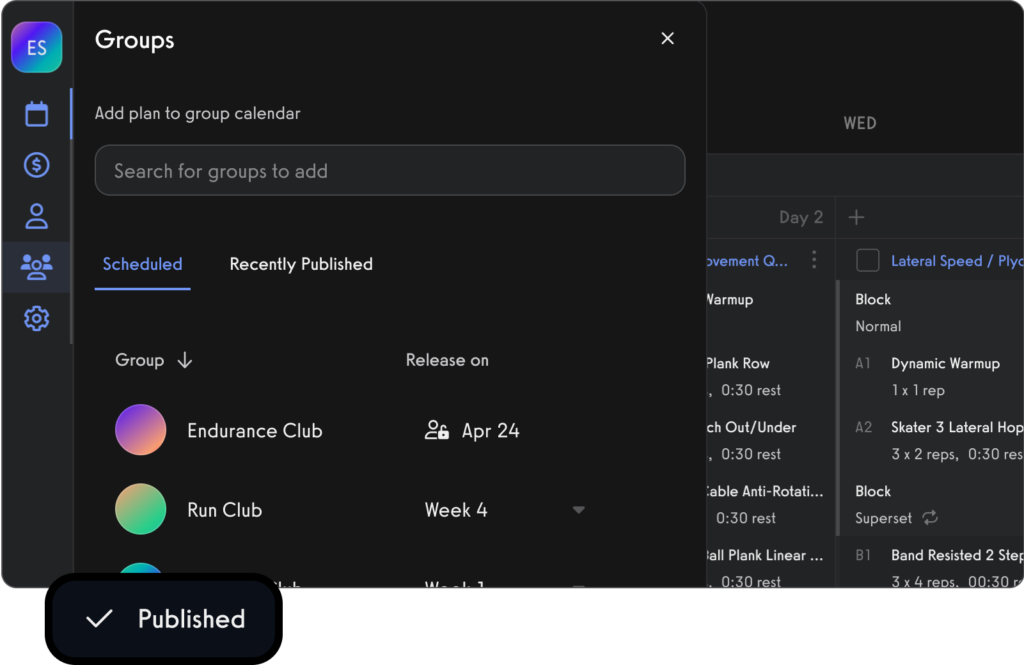Personal Trainer Employment Contract Template (FREE)
Use this free personal trainer employment contract template and modify as needed to create a personal trainer employment contract agreement for your fitness business.

Are you a gym owner looking to hire new personal trainers? If so, then you need a comprehensive personal trainer employment contract that outlines the terms and conditions of employment. An employment contract not only protects your business but also ensures a mutually beneficial relationship between you and your personal trainers. In this article, we will discuss the importance of an employment contract for personal trainers and provide a detailed guide on crafting an effective and legally sound contract.

Use the free personal trainer employment contract template below and then browse the comprehensive guide on creating an effective and legally binding contract for personal trainers.
And, of course, managing your fitness business online with the best gym management software and the best personal training software means that you can easily manage your business online with software that automates your business and saves you time. Communicate with members and clients with email, SMS, and in-app messaging marketing cadences, you can create fitness session plans, waivers, forms, fitness assessments, lead forms, registration forms, offer online booking, workout plans, and much more.
Process payments easily online or in-person with the best gym payment processing software and the best apps for personal trainers who want their very own fitness app.

Use the Exercise.com workout plan creator to create your workout plans and fitness assessments.

Publish your custom branded fitness apps to iOS and Android so you can offer a premium experience to your community.

Run fitness challenges, create online workout groups, do distance training, and of course, deliver fitness assessments and workouts, all right within the Exercise.com platform (custom branded to your brand).


Personal Trainer Employment Contract Template
[Your Gym or Business Name]
Personal Trainer Employment Contract
This Contract is made and entered into this [Date], by and between [Gym’s Name], (“Employer”) and Trainer’s Name.
1. Position and Duties:
- Job Title: Personal Trainer
- Primary Duties: The Employee agrees to perform the duties typically associated with personal training, including but not limited to conducting fitness assessments, designing exercise programs, leading individual and group training sessions, maintaining client records, and adhering to all gym policies and procedures.
2. Employment Term:
- The term of employment shall commence on [Start Date] and continue [specify term, e.g., indefinitely, for a specified period, or until terminated by either party].
3. Compensation:
- Salary/Wages: The Employee shall be compensated at a rate of [specify rate, e.g., $X per hour, salary of $X per year].
- Bonus/Commission: [Details of any bonus or commission structures, if applicable].
- Benefits: [Details of any health insurance, retirement plans, vacation time, or other benefits offered].
4. Work Hours and Location:
- Hours of Work: The Employee’s regular hours of work shall be [specify hours and days of work].
- Location: The Employee shall perform their duties at [Location/Address of the Gym or various locations if applicable].
5. Confidentiality:
- The Employee shall not disclose any confidential information pertaining to the Employer’s clients or business operations during or after the term of employment.
6. Non-Compete and Non-Solicitation:
- For a period of [specify time, e.g., 12 months] after the termination of employment, the Employee agrees not to engage in any business that competes with the Employer within a [specify distance] radius.
7. Termination:
- This employment may be terminated by either party with [notice period, e.g., 30 days’] written notice. Grounds for immediate termination include, but are not limited to, breach of contract, gross misconduct, or violation of gym policies.
8. Governing Law:
- This Contract shall be governed by the laws of [State/Country].
9. Entire Agreement:
- This Contract contains the entire agreement between the parties and supersedes all prior negotiations, agreements, and understandings.
Employee’s Signature: ____________________________________
Date: ____________
Employer’s Signature: ____________________________________
Date: ____________
[Additional Clauses or Special Terms if Any]
This Personal Trainer Employment Contract Template provides a comprehensive framework for the employment relationship between a gym or fitness business and a personal trainer. It covers crucial aspects such as job duties, compensation, work hours, and legal obligations. It’s important to customize this template to reflect the specific terms of employment and legal requirements of your location. This contract should be reviewed by a legal professional to ensure compliance with local employment laws and regulations.

Understanding the Importance of an Employment Contract for Personal Trainers
When hiring personal trainers, it is crucial to have a written employment contract in place. This contract serves as a legally binding agreement between you and your employees, clearly defining the rights and responsibilities of both parties. It establishes a framework for the employment relationship, ensuring that expectations are set and understood from the outset.
One of the primary benefits of an employment contract is that it provides clarity on various aspects of the job, including compensation, work schedule, and roles and responsibilities. By clearly outlining these details, you can avoid potential misunderstandings or disputes in the future.
Additionally, an employment contract helps protect your business interests. It allows you to include clauses that safeguard confidential information, intellectual property, and prevent personal trainers from competing with your business after they leave your employment.
Read More:
- Gym Rental Agreement Template
- Personal Trainer Contract Template
- Personal Trainer Agreement Template Examples
- Personal Trainer Rental Agreement Template
Key Elements to Include in a Personal Trainer Employment Contract
When drafting a personal trainer employment contract, it is important to include certain key elements to ensure it covers all necessary aspects of the job. Here are some essential components to consider:
1. Basic Information: Begin the contract by including the names of both parties involved, the date of the agreement, and the duration of employment.
2. Duties and Responsibilities: Clearly define the role and responsibilities of the personal trainer, including specific tasks they will be expected to perform.
3. Compensation and Benefits: Outline the details of the personal trainer’s salary, commission structure, bonuses, and any other benefits they are entitled to.
4. Work Schedule: Specify the working hours, days of the week, and any considerations for overtime or shift work.
5. Termination and Severance: Define the conditions for terminating the employment contract, including notice periods and severance pay.
6. Confidentiality and Non-Compete Clauses: Include provisions that protect your business’s confidential information, trade secrets, and restrict personal trainers from working for competitors.
7. Health and Safety: Address health and safety considerations, including any necessary certifications or requirements for personal trainers.
8. Dispute Resolution: Include a mechanism for resolving disputes, such as mediation or arbitration, to avoid costly litigation.
Crafting a Clear and Concise Job Description for Personal Trainers
A crucial aspect of the employment contract is the job description for personal trainers. This section provides a detailed overview of the tasks and responsibilities associated with the position. When creating the job description, it is important to be clear and concise to avoid any confusion or ambiguity.
The job description should include a summary of the role, outlining the primary objectives and expectations. It should also list specific tasks and duties that the personal trainer will be responsible for. By clearly defining the scope of the job, you can ensure that both parties have a shared understanding of the work to be performed.
Additionally, it is beneficial to include any qualifications or certifications required for the position. This can include educational requirements, specific training programs, or industry certifications that demonstrate the personal trainer’s expertise and competency.
By crafting a clear and concise job description, you can attract qualified candidates who are well-suited for the role and ensure that there are no misunderstandings regarding the expectations of the job.
Defining the Roles and Responsibilities of a Personal Trainer in the Employment Contract
The roles and responsibilities section of the employment contract is essential in clarifying the expectations you have for your personal trainers. This section should outline the specific duties the personal trainer will be responsible for performing.
Some common roles and responsibilities that can be included in the contract are:
1. Providing individualized fitness programs: Specify that personal trainers are responsible for designing and implementing personalized fitness programs for clients.
2. Conducting fitness assessments: Note that personal trainers will be required to perform fitness assessments to evaluate client needs and track progress.
3. Providing guidance and support: Emphasize that personal trainers are responsible for offering guidance, motivation, and support to clients to help them achieve their fitness goals.
4. Monitoring client progress: Specify that personal trainers should regularly assess client progress and adjust fitness programs as needed.
5. Maintaining a clean and safe environment: Emphasize the importance of personal trainers in ensuring the gym or training facility is clean, organized, and safe for both clients and staff.
6. Continuously learning and upgrading skills: Highlight that personal trainers should commit to ongoing professional development, staying updated with the latest fitness trends and research.
By clearly defining the roles and responsibilities of a personal trainer, you can create a shared understanding of expectations, setting the stage for a successful employment relationship.
Ensuring Compliance with Employment Laws in the Personal Trainer Contract Template
When drafting a personal trainer contract, it is essential to ensure compliance with relevant employment laws and regulations. This helps protect both parties by providing a legally valid and enforceable agreement.
Some important employment laws to consider include:
1. Minimum wage laws: Ensure that the compensation offered to personal trainers meets or exceeds the minimum wage requirements set by local labor laws.
2. Employment eligibility verification: Comply with immigration laws by verifying the personal trainer’s eligibility to work in your country, typically through completion of the required employment verification forms.
3. Discrimination and harassment laws: Include clauses in the contract that prohibit discrimination or harassment based on protected characteristics, such as race, gender, or religion.
4. Working time regulations: Comply with laws regarding maximum working hours, rest breaks, and statutory holiday entitlements to prevent potential violations.
5. Health and safety regulations: Ensure that the contract includes provisions related to health and safety, outlining the personal trainer’s responsibilities and any necessary certifications or training requirements.
By being aware of and adhering to relevant employment laws, you can protect your business from potential legal issues and ensure a fair and compliant employment relationship.
Essential Clauses to Include in a Personal Trainer Employment Agreement
When crafting a personal trainer employment contract, certain essential clauses should be included to protect both parties. These clauses address important aspects of the employment relationship and provide clarity on various issues. Here are some of the essential clauses to consider:
1. Probationary Period: Specify the length of any probationary period and outline the conditions that apply during this period, such as performance evaluations and the possibility of termination.
2. Confidentiality and Non-Disclosure: Ensure that personal trainers are obligated to maintain confidentiality regarding your business operations, client information, and any other sensitive or proprietary information.
3. Intellectual Property: Clearly state that any intellectual property created by personal trainers during their employment belongs to your business. This can include fitness programs, training materials, or any other work developed on the job.
4. Non-Compete and Non-Solicitation: Include provisions that prevent personal trainers from competing with your business or soliciting clients or employees for a specific duration of time after the termination of their employment.
5. Notice Period and Termination: Outline the notice period required for terminating the employment contract, while also specifying any specific grounds for immediate termination without notice.
6. Severance Pay: Clearly define the conditions under which severance pay will be provided to personal trainers, such as in cases of redundancy or termination without cause.
7. Dispute Resolution: Specify the process for resolving disputes, such as mediation or arbitration, to avoid costly litigation and promote a fair resolution process.
8. Entire Agreement: Include a clause stating that the employment contract represents the entire agreement between both parties, supersedes any prior verbal or written agreements, and cannot be modified without the written consent of both parties.
By including these essential clauses in your personal trainer employment agreement, you can protect your business and ensure a clear understanding of expectations for both parties involved.
Addressing Compensation and Payment Terms in the Personal Trainer Contract Template
One of the critical aspects of a personal trainer employment contract is the compensation and payment terms. This section outlines how personal trainers will be compensated for their services, including salary, commissions, bonuses, and any other benefits they are entitled to.
When addressing compensation and payment terms, it is essential to include the following details:
1. Base Salary: Specify the fixed amount the personal trainer will receive as their regular salary. This can be an hourly rate, weekly rate, or monthly rate, depending on the payment structure that suits your business.
2. Commission Structure: If you offer commission-based compensation, clearly define the commission structure, including the percentage or amount of commission personal trainers will receive for each sale or client they bring in.
3. Bonus Eligibility: Outline any criteria or performance targets that need to be met for personal trainers to be eligible for bonuses. Specify the conditions under which bonuses will be paid.
4. Payment Schedule: Clearly state the frequency at which personal trainers will be paid, whether it’s weekly, bi-weekly, monthly, or on a different schedule.
5. Deductions and Withholdings: Note any deductions or withholdings that will be made from personal trainers’ pay, such as taxes, social security contributions, or health insurance premiums.
6. Reimbursement of Expenses: Specify whether personal trainers are entitled to reimbursement for any job-related expenses, such as travel expenses, gym membership fees, or training materials.
By addressing compensation and payment terms in the contract, you provide transparency and ensure that personal trainers have a clear understanding of how they will be remunerated for their services.
Protecting Confidentiality and Intellectual Property Rights in the Employment Agreement
In the personal training industry, protecting confidential information and intellectual property is crucial for maintaining a competitive edge. Therefore, it is essential to include clauses in the employment agreement that safeguard your business’s confidentiality and intellectual property rights.
The confidentiality and intellectual property clauses should:
1. Define Confidential Information: Clearly define what constitutes confidential information and include examples, such as client lists, training programs, marketing strategies, or any proprietary information unique to your business.
2. Obligations of Personal Trainers: Outline personal trainers’ responsibilities in maintaining the confidentiality of this information, including prohibiting them from disclosing or using confidential information for personal gain or in a way that harms your business.
3. Intellectual Property Ownership: State that any intellectual property created by personal trainers during the course of their employment belongs to your business. This includes any fitness programs, training materials, or other work developed on the job.
4. Non-Disclosure Agreement (NDA): Consider including a separate NDA that personal trainers must sign, further emphasizing their commitment to maintaining the confidentiality of your business’s trade secrets and proprietary information.
By including these clauses in the employment agreement, you can protect your business’s valuable assets, maintain confidentiality, and prevent personal trainers from using sensitive information against your interests.
Establishing Termination and Severance Policies for Personal Trainers
In any employment relationship, the possibility of termination exists. Therefore, it is important to establish clear termination and severance policies in the personal trainer employment contract. These policies outline the conditions under which the employment relationship can be terminated and how severance pay, if applicable, will be determined.
When establishing termination and severance policies, consider the following:
1. Notice of Termination: Specify the notice period required for both parties in the event of termination. This ensures that both you and the personal trainer have ample time to plan for the future.
2. Termination without Cause: Address situations where termination occurs without any fault on the part of the personal trainer, such as redundancy or downsizing. Specify the notice period and any severance pay that will be provided in these situations.
3. Termination for Cause: Define the grounds for immediate termination without notice, such as serious misconduct, breach of contract, or any other actions that significantly impact your business’s reputation or operations.
4. Severance Pay: Clearly outline the conditions under which severance pay will be provided, such as termination without cause or redundancy. Specify the calculation methodology, such as a specific number of weeks’ pay based on years of service.
5. Return of Company Property: Include a clause that requires personal trainers to return any company property, such as keys, access cards, uniforms, or equipment, upon termination of employment.
By establishing termination and severance policies in the employment contract, you can ensure a fair and transparent process while protecting your business interests.
Understanding Non-Compete and Non-Disclosure Agreements for Personal Trainers
Non-compete and non-disclosure agreements (NDAs) are essential tools for protecting your business’s interests when hiring personal trainers. They prevent personal trainers from competing with your business and restrict them from disclosing confidential information or trade secrets to others.










